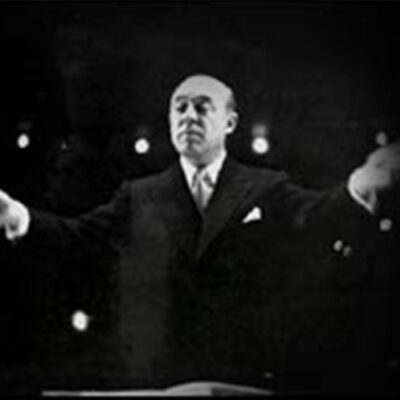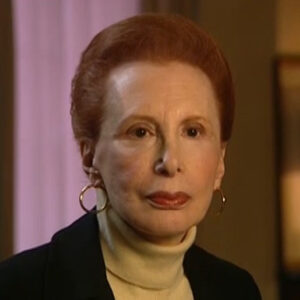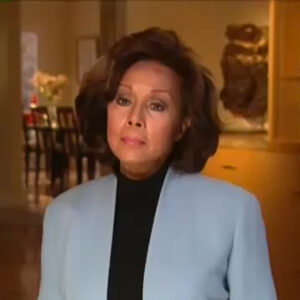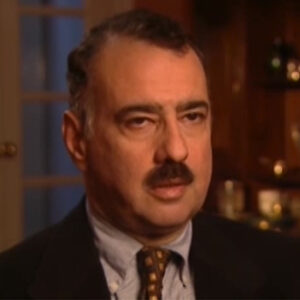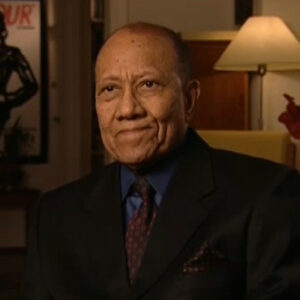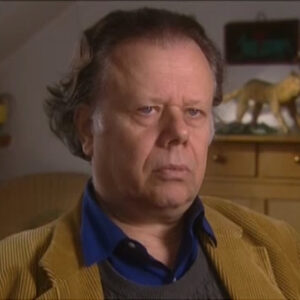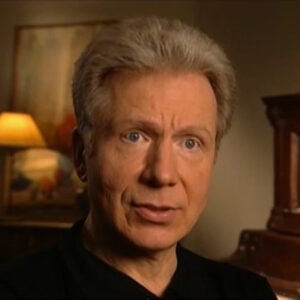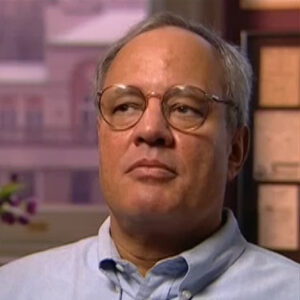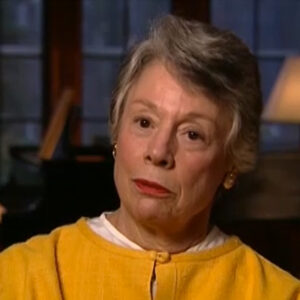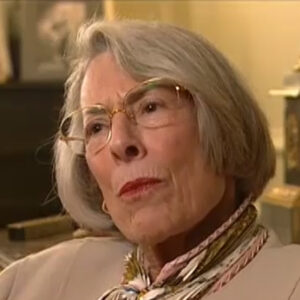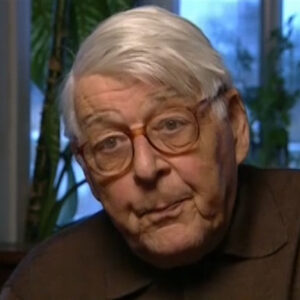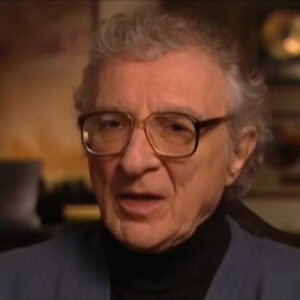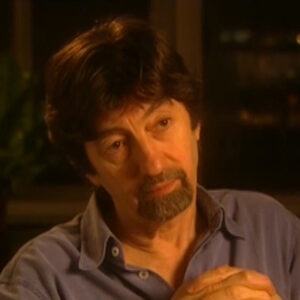Speaker 1 Yeah, I’ve seen a lot of productions of Rodgers musicals since I’ve been here for 18 years, so I’ve seen the good, the bad and the ugly and pretty much everything in between. The first thing that I observed was when I would go see a production. The quality of the production was in complete reverse to the amount of fuss they paid about my being there. So if they didn’t want to pick me up,
Speaker 2 yeah, we got to stop. We’ve got Sirin. How many years?
Speaker 1 I’ve been here for 18 years. And during the eight years I have seen productions of Richard Rodgers musicals from The Good, The Bad, The Ugly and pretty much everything in between. The first observation that I made was that the productions tended to be the quality of the productions, tended to be in adverse proportion to the amount of fuss that they would play and pay about my being there. I mean, I will never forget the first summer I was here, I went to production of I’d Rather Be Right at Columbia, but let me start that again. The first time I was at this office, I went to Ohio State University where they were doing a festival of depression shows, and they did. I’d rather be write a less well-known Rodgers and Hart and Kaufman and Hart musical. And they avoided me at all times. They didn’t pick me up at the airport. There was no place. There was a letter at the hotel where I was supposed to be and nobody wanted me to make any connection with me whatsoever. It was fabulous. And I’d never I never experienced that show. It was also the first time I heard a 1930s Rodgers and Hart show performed in the original orchestrations. This predates the whole movement of people doing shows in the original orchestrations. It’s really started in the 80s. It just blew me away. Now, the orchestra was made up of the Ohio State marching band and they didn’t have any strings. And that’s why they were concerned, because there was no strings. Section was just a piano. But the marching band knew how to play the strings, the brass, the percussion. It was fabulous. And I fell in love with the show because it’s a really interesting show. I have seen some peculiar productions, NYU did a mighty odd production of South Pacific in which they they placed the whole thing in a rehabilitation ward and applied. This concept of the doing of South Pacific was part of rehabilitation with everybody coming back from the war. That was interesting. And, you know, I’ve seen wonderful high school productions that have the heart correct, even though no one in the cast is terribly enthusiastic or I mean terribly talented. I’ve seen professional productions that just don’t have a clue what’s going on. I also have said that that there are always things to learn about Richard Rodgers. And the day that I stop learning something new from a production is is the time for me to go do something else. And it just it always there are new things happening all the time. I mean, the most recent one, which actually is about Hammerstein, but it’s a Rodgers and Hammerstein show, is in Oklahoma when people will say we’re in love, which is a wonderful is, you know, wonderful song about, you know, we aren’t in love. But of course, the audience knows they are in love. So it’s a great We’re Not in love song. And she’s Laurie sings Don’t Please My Folks Too Much. And I realized she doesn’t have folks her parents are not in the show. So does folks mean Andela, who is the one kinfolk that she has that she’s close to, or is it my country folk, you know, and I thought got three different ways you can take it or it’s just a goof or she’s just sort of making fun of of the whole song is posturing, so maybe she’s just posturing about it. So I thought that, you know, their layers and layers and layers tell me.
Speaker 2 Let’s do the statistic. Well, we have it. OK, you still rolling? So I’ll ask the question. Do that. Give us the statistic of how many shows, how many, all that sort of stuff. And, um, in some context, the context is, tell me whether you’re still surprised at how diverse it is or is it really repetitive? I mean, after so many shows, obviously, it’s got to be repetitive right now.
Speaker 1 Richard Rodgers was a consummate theatre composer. He wrote 40 musicals for the musical theatre from the time he was 22 years old until six months before he died. And within that, there were some 900 songs. Only one or two did not come from a show. And the most famous of that one is Blue Moon, which they tried to put into a movie and couldn’t. And the music publisher said, Why don’t you write me one of those June Moon Spoon kind of lyrics? He was a man of the theatre. He lived for the theatre. He also was a man who was both influenced by and therefore influenced the period in which he was writing. No other composer, certainly no other theatre composer, has two completely distinct parts of his career. In fact, he had three. It just happens that the last third of his career didn’t end up with as many good shows as either the first, third or the second third. So I think starting in the early 1920s with Rodgers and Hart, they were musical comedies. They were frivolous, they were silly. They were the situation comedies of their day shows were written for silly reasons and went on your toes was written. The Bally Roosted toured the country and there were men naked to the waist. And it was a scandal from coast to coast. So somebody said, hey, let’s put that into a musical, you know, and then somebody else, they got Balanchine to do the dance. And some somewhere along the line, someone said, well, if we’re going to have this story with the ballet company, why don’t we have some gangsters in there? And at the end of the show, they ended up writing Slaughter on Tenth Avenue, which has become a classic, you know, on its own. But it was all done for sort of showbiz silly reasons when Oscar Hammerstein and Richard Rodgers got together in the early 40s in the same way that Richard Rodgers had been working on musical comedies and writing, you know, sophisticated, witty things. Oscar Hammerstein had been, for lack of a better word, working an operetta. And when they came together, the merging of the kind of frivolity and fun of Rodgers and the operative Hammerstein created something which was unique. And it really was, for lack of a better word, a musical play. And that’s really what they did. So Richard Rodgers, the second third of his career was with Oscar Hammerstein. And they were very, very different shows than the Rodgers and Hart shows. And then after after Oscar Hammerstein died, the first show he wrote, Richard Rodgers couldn’t find a collaborator. He wrote his own lyrics. And I think it’s extraordinary and perhaps apocryphal. But the first words that you heard in that show were the sweetest sounds I’ve ever heard are still inside my head. That’s a pretty confident. Comment for somebody like Richard Rodgers to make
Speaker 2 wonderful, you just answered about a page of my question. Well. Let’s talk about show’s successes. If you want me to get me to give you the statistics that Mandelbaum writes about in the anatomy of a flat thirty five hour eight shows, only a few of the thirty five shows that they did were not successes, and only one in nine was not a real moneymaker,
Speaker 1 one about which ones were successes.
Speaker 2 I want to talk
Speaker 1 about success and failure.
Speaker 2 Success. OK, um, basically I want you to talk about the success. Let’s not not hard now this is than OK. Talk about the success of Rodgers and Hammerstein and it seems fairly amazing. And was everybody
Speaker 1 successful? Mm hmm. When when Richard Rodgers and Oscar Hammerstein started to work on Oklahoma, they were both still parts of other teams because Rodgers and Hart were still writing and Hammerstein was writing with anybody who he who would write with. And basically, Jerome Kern was his favorite collaborator. But he also had collaborated with George Gershwin and operetta Sigmund Romberg earlier. So the idea of Oklahoma came out of the fact that both men were attracted to this story and neither of their other collaborators were particularly attracted to it. So it was sort of a one off. It was not a planned collaboration where people thought, oh, if you got this composer and this lyric writer together, magic will be made. Not at all. That’s not the way shows get made anyway. So they both were attracted to green grow the lilacs. They sat down and to their dying days. They said we simply took the play. We talked about it and we wrote the musical that we thought came out of that play. And what I’ve always felt about Oklahoma is it’s kind of an invisible revolution because on the surface, it looks very homespun. It looks very straightforward. The story is fairly simple, and it doesn’t really seem like it’s revolutionary in the slightest. A lot of it a lot of the plot points or some of the important plot points are done in dance. But that had been done before. A main character dies, but that had been done before. But what I really think it was, was the first time that every single element somehow was working together so that the audience could buy this as one artistic entity. Rogers used to say that in order for that to happen, the orchestrations have to sound the way the costumes look. And I think that’s a great way to say it, because basically it means, you know, if the costumes are going to be purple, you know, something in the orchestra has got to acknowledge the fact that the farm girls in purple or something, you know, that kind of stuff. And it’s a little amorphous. But but that’s what the artists need needed to get into what they ended up creating. It’s also it was fascinating. Once Oklahoma established itself, it was a hit unlike any that had happened in years, probably since Showboat. And therefore it became clear to everybody that whether anybody liked it or not, a team had been formed. There was a new team here and they could go back to their other collaborators. But why do that? Because they were both men who lived for writing. They loved the theater. So they started to write and they did crank out a show every other year until Oscar Hammerstein died. And I don’t think anybody else has ever done that. And clearly, with the success of the shows, not only do you produce a show and produce it on Broadway, but then there are productions, road companies, touring productions, foreign productions. There’s a management of a hit show that in some instances can be a career unto itself. And they just they were managing Oklahoma and Carousel and South Pacific. They were all sort of going on, you know, at the same time. It was I mean, I can’t imagine how they did all that, but they did. They also after Oklahoma, they they were again approached by the Theatre Guild, who had produced Oklahoma with the idea of Lilium Milena’s play Lilium, which took place in Budapest. And in the conversations that took place, they decided that Budapest was not a place that they felt comfortable setting a musical. And the idea of doing it on the Maine coast and sort of making a New England parallel to the story in Hungary seemed to make sense. And it also allowed them to to to create a great music and lyrics for a different scene, a different area. And it was an enormous success. Then came their biggest flop.
Speaker 2 Yeah. You never said carrousel. I didn’t think I said give me I’ll start again. Just you can condense the. Yeah. The main coast.
Speaker 1 That’s not that interesting, actually. Let me forget that. Let me talk about the.
Speaker 2 Go ahead.
Speaker 1 OK, Rodgers and Hammerstein wrote a new musical every other year, basically from 1943 until 1959 when The Sound of Music opened, which was as successful as their first. Which is interesting because today at the office here in Oklahoma and Sound of Music are the number one in two shows that we license across America. And they do switch positions from year to year, but it’s very interesting that it’s no doubt the first and the last of the bookends. But right after Oklahoma, they did carrousel another success. Artistic success didn’t run quite as long as Oklahoma. Then they did a show that was very heartfelt. It was Oscar Hammerstein’s idea. He wanted to do an original musical. And what he said he wanted to deal with was the point in your life when you become really, really good at something and you’re suddenly asked to be on committees and asked to help out. And you have to do good things if you’re a good citizen. But doing those things takes you away from that which you did well that got you there in the first place. And as Steve Sondheim said a couple of years ago when he introduced a concert production at the time, Steve Sondheim, a teenager who was a friend of the Hammerstein, thought that was a rather esoteric and particular concern today. Steve Sondheim understands it then. He did not. Allegro was the show and they told it as a sort of everyman story. And in fact, for the first time, they hired a director and choreographer and it was a woman for the first time and it was Agnes to mill. The scenery was very cinematic. There were projections. There was a Greek chorus. There are thousands of innovations that happened in that play. And it didn’t work. It didn’t work big time. I mean, it got the kind of reviews that that successful people doing shows that that people aren’t that interested and get some people really liked it. Some people said, I don’t get it. Some people said it was awful. But I think to Rodgers and Hammerstein, it was a big shock because they had done these two extraordinary musicals. Now they came a cropper with this one, which in a way puts their next musical in a very, very interesting kind of scrutiny, because I feel they needed the next one to be a hit or they were over or they had been a little bit of a bubble. They’d done these two wonderful shows. They’d done this show that didn’t work, and then they would go off and do other things. So when they got to the next show, which was South Pacific, based on a Pulitzer Prize winning book that was about World War Two, it was at the end of the 40s. World War Two was a very current topic in America. They wrote four stars, which they’d never done before. Mary Martin, your who was under contract to the Civic Light Opera in California, and they the Civic Light Opera, had absolutely no idea what to do with him. And basically Rodgers and Hammerstein said, I think we could use him in this show. So it relieves the civic light opera of their financial and contractual responsibilities. And they collaborated with Josh Logan in a way they had not collaborated with anybody. He’s co-author of the libretto, which never happened. And they really worked, I think, overtime to make certain that South Pacific was a hit. And as a result, it was a bigger hit in its day than any of the others up until that point. So they clearly established themselves as some force to reckon with in the musical theatre.
Speaker 2 All of that is wonderful. If we could now just give me two sentences to talk about their success, OK, I was OK in that shows then I can use that altogether together. A great scene, Larry.
Speaker 1 It’s it’s 11 five now, but it’s Rodgers and Hammerstein. He won’t talk about Rodgers and Hammerstein.
Speaker 2 Yeah, yeah.
Speaker 1 It’s it’s 11 shows, right. Seven one movie, one television and nine for Broadway. Right. OK, so I thought, OK, Rodgers and Hammerstein wrote basically a new show every other year from the time they started collaborating until Oscar Hammerstein died. And of those they were 11 scores in all seven musicals for Broadway, of which five were enormously successful, one was moderately successful and the others were not. One television show Cinderella and one movie state fair. So it’s a pretty astonishing success rate, I think.
Speaker 2 Let’s fill in the South Pacific story. Tell us about in Pina, Pinza, Pinza. Um, they wanted him. They got him. Then they sort of dug a hole that they had to fill.
Speaker 1 When when Rodgers and Hammerstein cast your Pinza in South Pacific, they obviously had a a first rate Metropolitan Opera Bozzo, who had never done a musical before and and his voice was not had not gone. It’s interesting that usually people nowadays think of opera singers doing musicals when their voices are shot. Not so. He still had his powers and so they had a basso profundo or baso anyway. They also had Mary Martin. Mary Martin was a girl from Weatherford, Texas, who was a showgirl. I mean, she she sang show stuff. She wasn’t a real singer. And so the challenge, which I think everybody felt certainly Mary Martin said, I don’t want to sing with I don’t want to compete with Ethiopians. I can’t a a Broadway singer cannot compete with a bass, an operatic bass, so what Rodgers and Hammerstein did in South Pacific was they created songs that are operatic for the opera guy, show biz for her. And then in one instance, they’re only like eight bars where they ever sing together, because that’s one of the things Mary Martin said. I don’t ever want to sing with him. At the same time, I will sound silly. And they created in such a way that by the time it comes in the show, it’s so charming that you’re completely won over. And actually he’s kind of being silly at the time. So, you know, it worked very well. Richard, let me talk about Roger’s here, because what Richard Rodgers was able to do in that instance was to write music that was appropriate without being a parody or without going too far, that you’re necessarily aware of it because some enchanted evening was the NCO Pinza character’s main song. And it’s a very it’s a lovely melodic low, you know, gutsy melody I’m in love with. The wonderful guy is hers. It’s bouncy. It’s, you know, it’s fun. Now, the genius of a composer is to be able to write a score in which those two kinds of songs are going to be in an evening without an audience feeling. Wait a minute, why am I getting opera when I’m getting show? Because it doesn’t make any sense. He was always able to find a common thread through his music in any score. So you bought it as a theatrical whole. And yet within that theatrical whole, he took you to various places which you were perfectly willing to go without ever saying, why am I there?
Speaker 2 Yeah, well, yes, but wait one sec. Yeah, let’s do that next. When you first told me that Mary Martin story, you made it her story. She said, no, I can’t do that. Can you do with that?
Speaker 1 Sure, sure. Sure. When Larry might write that as Hammerstein, they both saw one touch of Venus, is that right? That got that’s where they got the idea of Mary Martin that I don’t know. OK, from from
Speaker 2 let’s face it.
Speaker 1 Oh, OK. But I don’t tell a broad based story as what I know to what he said. I know you don’t want to. Right. Right, right, right. Mary Martin was signed for South Pacific first and Mary Martin was known to Rodgers and Hammerstein because they were all working at the same time. And actually they wanted her for Oklahoma and she declined. So when she came on board, she was she was a show singer with a fairly low pitched voice when they were excited about casting NCO Pinza, a bona fide opera base in the part opposite her. She reacted badly and she said, I don’t really want to compete with him and I don’t want to bases. I don’t think that’s a really good idea. And you just have to promise me that you’re not going to you know, you’re not going to make me compete with him on stage. And so what they were able to do is create the score in such a way that they never compete with each other. Early in the show, they have what’s called the twin soliloquies, which is exactly that. It’s he’s on one side of the stage telling us the audience, his thoughts. She’s on the other side of the stage telling us her thoughts. And the music is sounds of a piece. But if you listen to it carefully, it’s very different music that he’s singing than what she’s singing. But when they come together at the end, it’s very clear that it’s all meshing into one musical, you know, statement that is, you know, that is filled with passion, filled with romance and you buy it.
Speaker 2 Did Rodgers, as far as you know, ever express any trepidation about now? I’ve we’ve seen these two people and oh, my God, how am I going to do this?
Speaker 1 I don’t think Richard Rodgers expressed trepidation ever. I think Richard Rodgers was perhaps primarily confident. I mean, there are wonderful stories of him never keeping his eye off the ball, as they say. I’m Josh Logan. You know, when I hear somebody else’s story but tell the story, OK, when when Rodgers and Hammerstein were producing a show the Josh Logan directed called Happy Birthday, it was a play they opened in Boston and it didn’t open very well. And Joshua Logan, Rodgers and Hammerstein were walking back to the Ritz Hotel. Josh Logan thought he was going to be fired. After a couple of places, Oscar Hammerstein turned and said, let’s fix it. And Richard Rodgers said by Monday and Josh Logan felt this, this gave him the confidence to realize this was not about getting hysterical. This was about we have a job. We have we have work to do. Let’s do it. And I think that’s the way Richard Rodgers approached his entire career. Here’s the job. Here’s the situation. Let’s solve the problem. Let’s do it. And I think he really and so I have a feeling on South Pacific, the challenge of writing a score, knowing that you had, in essence, two bases of a very, very different styles to write for together and apart. I think that’s what fueled him.
Speaker 2 Great. You’ve already been speaking about innovation, so maybe you could give me, um, the sort of ticking off list through Roger’s entire career, was he always trying to do innovations or was it just sort of he couldn’t help himself? What are some of the innovative things that happen through hard through him?
Speaker 1 I think that Richard Rogers would always say, and I don’t think he always did say that I did what I thought was the right thing to do. Along the way, he touched bases on many innovations which have a profound influence to this day in the musical theater, he was with Rodgers and Hart. They were the first ones to set Shakespeare, the boys from Syracuse. The whole notion of how dance is used in musicals comes through Rodgers and Hart and then, of course, with Agnes to Mills Ballet in Oklahoma. That was revolutionary because it really told a vitally important part of the story. In Dance, you can’t end the first act of Oklahoma without the dance because that’s where the story gets resolved. At that point, he was OK. Tell me what other innovations are there, that
Speaker 2 race both in and. Hmm, no strings, no strings and also in an audience. And I said, OK.
Speaker 1 Just because I just don’t think anyway,
Speaker 2 but but that’s important, what you’re about to get to is very, very important, whether he was avoiding it. Yeah. There he was even aware of it.
Speaker 1 Or Oscar Hammerstein and Showboat in 1927 took some very bold moves in terms of how to deal with race in a story in a musical theater. And to this day, there are people who argue about whether he was a visionary or whether he was of his time and therefore a little outdated today in the way he dealt with basically the black characters in Showboat Rodgers and in the Rodgers and Hart era tended not to deal much with race. However, when when they started to work on, for example, flower drum, well, when they started to work on the King and I first there is a there is a clash of cultures. And again, they were attracted to a story. It’s a wonderful story. And part of the story of the King and I is a clash of cultures. You know, here is the king of Siam. Here comes an English schoolteacher. And you know, the rest of the play, you see how they how they how they explode with each other. Again, it’s very easy in this day and age to say how dreadful, because it’s the mean West English, especially thinking that they can come and humanize this barbarian world. And therefore, you know, King and his hopelessly outdated. Well, I contend that, first of all, if you look at the history of King Mangat, which is the history on which that show is based, he asked for the West to come. He was the visionary who realized this was the way he would not get conquered. So that right away, it’s like, oh, this is kind of an interesting guy. He’s a visionary. And she came in, she came as a hired hand and she just was a very modern feminist woman who stood up. I mean, she stands up to the king of Siam. She says to him, You made me a promise and you’re going to come through with the promise. That’s a schoolteacher to the king. Let’s not forget that, you know, all kinds of stuff like that. But it doesn’t say innovation, innovation out at you with flashing lights. Basically, I think audiences are intrigued by the fact that they’re human people, their stories. And suddenly you’re just absolutely captivated by what’s going on in the story. And then you realize, wow, this is really about some pretty heavy things because there’s some some cultural clashes here. There’s some interesting which one who wins is there. If there’s if there’s a fight here, who wins? Well, you can make your own determination. When they got when Rodgers and Hammerstein got to Flower Drum song, it was the first musical in which it was all about the Asian community coming to the United States and dealing with assimilation. And, you know, it’s one of the few few shows that had an all Asian cast. It’s true that in the 1950s it didn’t really have an Asian cast because it was still at a time where if they couldn’t find Asians to play parts, you know, there were people with funny makeup on, which is unacceptable today. But in that day, you know, they cast as many Orientals as they possibly could or Asians. And that and the whole story of flower drum song, the whole story of it is, OK, I come from another country. I’m coming to the melting pot. I’m coming to the United States. How many how much of my culture can I should I and must I hold on to? And how much of my culture has to be given over for this land that I’ve come into? Very interesting stuff. And then, of course, after Hammerstein died
Speaker 2 where we have here, and it’s just like, OK, OK,
Speaker 1 OK. After Hammerstein died, the first show that Richard Rodgers wrote alone was a show is a story about a very glamorous black woman and a white man in 1962. I mean, that was a bold thing because the one thing that nobody was interested in in America in 1962 was a black woman and a white man or vice versa as well. It was a very bold, innovative thing to do. And it’s a wonderful, wonderful story and a wonderful show. And, of course, the sweetest sounds, you know, is basically the theme song of those two characters. They can’t they hear the sounds in their own minds. And will they ever, you know, hear the other sounds and ultimately they don’t. That means you’re a teenager in the in the teen teen period of this century would be listening to the popular music that was around, as Richard Rodgers did. He also went to the theater. He had operetta available to him. And I think every artist is influenced when they start by what they know and sort of standard. And so his early songs sound like songs from the 20s. What’s what then becomes kind of fascinating is you hear his voice starting to come out in some of those early songs, both in the kind of melancholy that that starts to come in some of the ballads Spring is here and things like that. Fascinating. But at the same time, the sort of humor in the jolliness of things like Manhattan and mountain greenery, but all influenced by the fact that they’re going to be performed on a stage. I mean, that’s that’s what’s kind of amazing is that he clearly understood the scope of music that gets performed and displayed on a stage in front of a lot of people lined up in rows looking at it. It’s very interesting. I was in England a couple of years ago and saw a benefit performance, a potpourri benefit performance. So, you know, somebody come on and sing a song and go off. And it was moderately entertaining. And some guy came on stage and sang a song from Cinderella. And it was the moment when I suddenly realized, you know, that song, unlike all the other songs that have performed this evening, it fills this space. It’s got its scale, the scope. It just feels it hard to put your finger on it. But that’s what he knew. He knew how to write for the inside of that building. And it was amazing.
Speaker 2 I want to touch on some of the innovations of heart again, if you OK, the Rodgers innovations and heart. Um, let me give you a list and maybe you can just give them to me on 10th Avenue Act one of babes in arms. And if you could,
Speaker 1 I mean, all the songs that are in.
Speaker 2 Yeah, yeah. Why that’s innovative. What it is. I’d rather be right in Syracuse and tell Julie and if you could sort of do a phrase of each so that we just do it in a few sentences. That would be the innovations.
Speaker 1 Yeah.
Speaker 2 So possible.
Speaker 1 Yeah. And I’ll try. I’ll try. The innovations. The innovations of slaughtering on 10th Avenue simply, you know, dark dive. There’s nothing about that music that makes you think the man who wrote that has Edelweiss anywhere in him at any time,
Speaker 2 because you’re exactly right.
Speaker 1 Well, what do you want?
Speaker 2 What what is I want to know just where they were innovating. I want to know that here are two guys that are working with among hundreds on Broadway. And they’re not just doing the same old thing. OK, so I want to what I the reason I stopped you was to say, let’s preface this
Speaker 1 on your toes, which was in nineteen thirty six. Rodgers and Hart musical was innovative in the way it used dance. It was partly influenced by the notion of the ballet roots, having toured the country with men naked to the waist for the first time ever, but also in the thinking, the dance thinking because Balanchine was there and Balanchine was a man who hardly spoke English at that time. But as Roger said, he spoke a lot of dance and they conceived the idea of a dance in a dive on, you know, slaughter on Tenth Avenue, but ended up being slaughtermen 10th Avenue and here, here and innovation in terms of Broadway musical comedy. Here’s a Broadway musical comedy in the mid 1930s where people expect, you know, people to come down front and sing a funny song and go back in. And here is this, this raucous, dirty kind of Gershwin esque, almost music that’s an orchestrated within an inch of its life with, you know, sort of raunchy trumpets and I mean, extraordinary. And if you go into a theater, you know, thinking that they’re going to be nice little girls and, you know, petticoats and stuff like that, this is not what you expect. This is the kind of innovation that he did. But Rogers would always say in terms of innovation, it’s what the story told me to write. It’s what the whole thing’s, you know, I just OK, that’s an idea. Let me go do it. Similarly, 1937, babes in arms. Somebody came up with the idea. Wouldn’t it be fun to do a show about kids, all kids. So they thought the and again, Rodgers and Hart wrote this themselves. So we can only believe that they came up with this idea. They saw some kids playing in the park and they saw the sort of society that the kids made for themselves. There was a boss that was a leader. There was follower’s. So they thought, what if they were kids of vaudevillians? As the vaudeville parents had to go out on the road. And here with these kids left and this somebody says to them, you know, you can’t stay here as kids, you’re going to go to the sheriff was going to send you to the work farm and they say, no, hey, let’s band together and we’ll put on a show. It’s a pretty silly idea, pretty silly story. Mickey Rooney and Judy Garland used it time and time again in the movies and it work. This was before all of that. So therefore, there’s the notion of the story was innovative. But then what a Rodgers and Hart do. They decide to write songs for 16 year olds and what do they write? The greatest collection of sophisticated songs done in cabarets to this day, My Funny Valentine. The Lady is a tramp where or when I Wish I were in love again. Johnny one note. That’s all from this one score. And they were all introduced by six year olds. So even though, you know, we now go and see Peggy Lee and Barbara Cook sing these songs brilliantly, they were written as a as a lark. Six year olds were supposed to sing where when I’ve seen you before, I mean, it’s wonderful because, again, it goes right back to the whole thing. It’s theatrical. It’s a theatrical idea. They approach things the way they want it to approach them. And as a result, it was innovative. Nobody could sit down and say, I’m going to write six of the greatest ballads, you know, ever and put it in the mouths of kids. And I know I’m going to immortality is going to come by doing that. Absolutely not. And in doing that, they just sort of in some ways fell into one innovation after another.
Speaker 2 Wonderful.
Speaker 1 Did we get hit them all? Well, I’d rather be right. The political stuff. I’d rather be right. Yeah. In 1937, Rodgers and Hart wrote a show called I’d Rather Be Right. I’m with Kaufman and Hart. It was the only collaboration, the only Hart Hart collaboration that I know of. And it was about FDR and George M. Cohan played FDR. And again, it is filled with topical references that if you don’t know what happened during the Roosevelt administration in the fact that the Supreme Court pops up, out, you know, from from behind the bushes and there there it is at his command in a way, it doesn’t even matter if you don’t know that. You just know the way it’s constructed, that it’s funny, it’s appropriate. And then, you know, then there then suddenly, bam, it’s a political satire in the middle of, you know, a musical comedy land. There’s also I mean, one of the things I love about that particular show, which doesn’t really have to do with with Rodgers, but at its heart of hearts, the idea that Roosevelt runs into this young couple in Central Park and the young man says, you know, oh, Mr. President, we want to get married, but we don’t really know where this country is going. So could you tell us? And so the host then as the show unfolds and at the end he gives the speech where he basically says, you know, this young couple said to me, the president, the United States, we don’t know where this country is going. And so we’re nervous about. Getting married, what’s our future going to be? And I realized as president. United States, that’s what this country is built on. And if those people give up the ghost, where are we going to go now? I ask you this, isn’t that the most dated comment you’ve ever heard in your life? You can hear a pin drop in the theater when I first heard that show
Speaker 2 was pretty appropriate for today’s election. The other conclusion and
Speaker 1 well, I was I mean, I’ve done enough of this that I’ve learned. If you’re from first stop cutting tape is easy going off in the wrong direction. For hours,
Speaker 2 boys from Syracuse,
Speaker 1 the boys from Syracuse was the first time that a Shakespeare play had ever been used as the basis of a musical comedy. A preposterous notion, but a notion that they took on. And actually, there’s a funny line at the beginning, this one line of Shakespeare. And because it was sort of it was a funny idea, you know, they make a point of that’s the Shakespeare line. But at the same time, another reason why they did it was because Lawrence Hart’s brother, Teddy Hart and Jimmy Savile, a comic, looked look the like, and they wanted to write a show for these guys and they wanted to play twins. And they’re the Romeos and there’s, you know, the boys from Syracuse. And I mean, it was there’s always a reason behind the innovations that seems very practical. Pal Joey is another show that to this day, its innovations and its point of view is known, known to be remarkable. First of all, it was an anti-hero. Joey is not a likable character. It’s it’s his story. Who is he? Why do we care about him? He was originally played by Gene Kelly, which is one of the most interesting things that we don’t understand today. I don’t understand this because Gene Kelly must have been charm personified on stage, and yet he’s playing a heel. A lot of people today think that you have to play Joey really mean spirited and, you know, down in the dumps and Gene Kelly played him. He’s got to have been charming. And it’s a relationship between this hustler and this rich older woman and the younger ingenue. Fascinating stuff. One of the fascinating things about Joey, however, is it is a sort of show at the cusp because a lot of times in Pal Joey, there’s the 1930s tapping on the shoulder and saying this isn’t as innovative as you think. The ingenue, for example, has a couple of wonderful songs, but basically she’s not a character. She has nothing to do other than the engineer. That is the other part of the triangle.
Speaker 2 You have one hair that I want
Speaker 1 to try to OK, I saw something going on. I didn’t know what that was.
Speaker 2 The book you talk about things like casting. Um, tell me whether Rodgers just wrote the music or was he maybe involves a little more than one.
Speaker 1 Rodgers was as involved in his shows as he possibly could be in all levels.
Speaker 2 He’s, I think of overlap.
Speaker 1 OK, sorry. Rogers was not a man who closed the door to the room with the piano and wrote the songs and wrote them on the paper and opened the door and handed it to somebody else. He had his hands on everything in the production that he could in the Rodgers and Hammerstein days, the two of them produced after Oklahoma. He alone produced a revival of a Connecticut Yankee, partly as a way to acknowledge his debt to Lorenz Hart, who wasn’t having a good time of life. And in fact, that was the last thing he was ever involved with. So, you know, he loved producing. He had a hand in casting. Some of the shows were written for specific people. And at that point, they were people that he liked or they weren’t cast when they went and found people they did not know. The most famous one of that is Yul Brynner. I mean, they wrote a king. And either original idea for the role of the king was Noel Coward or Rex Harrison is strange ideas now that we think of that character as they ended up writing it. And, you know, was Mary Martin who said, I know this guy who was in Lutsen song with me and you really have to audition him, even though he was a director at CBS at the time. And he came and gave a classic audition, you know, with a guitar and would barefoot in cross-legged on the stage and started to wail, you know, and they all sort of said, I guess that’s our king. But even then even then, once they got him, Rodgers listened to what he was all about and wrote fascinating music to find how you could put music into a character who’s basically not a naturally singable guy. There are some very interesting cut songs. There are not many cut songs from Roger’s career, but there are some interesting ones in The King and I and what they are are trying to find a voice for that character and that man. They ended up with the puzzlement, which is it is a perfect character song for him and quite fascinating.
Speaker 2 Take a sip of water because your lips are getting dry and. Tell me whether he was a control freak or not. And tell me about Broadway being the most disparate untogether and whether being a control freak is a good thing to be. Why not? Or did it help him? Did it hurt him? What about that?
Speaker 1 Good composers have very clear ideas of how they want their music performed. Richard Rodgers was a good composer. He had very clear ideas of the way he wanted his music performed. And he was very perhaps he was a control freak. I’m not sure that it’s fair to him to go that far. But he certainly wanted to mix. He wanted to know how his stuff was going to be done. There’s a famous story that Peggy Lee recorded Lover and did a very jazzy arrangement of Love Her. And when Rogers saw her next, he said, Miss Lee, that’s a waltz, which was his way of saying, you know, you didn’t sing it as a waltz. I wrote it as a waltz. Interestingly, he did think because he was a concert man of the theater, but he was also aware of popular music and of course, liked the fact that his his songs got out into the popular world, that he didn’t want people to mess around with his songs. He never wanted people to mess around with his songs in the shows. But he didn’t mind if artists did arrangements. But he wanted a few years to go by. He wanted the songs to to be introduced to the world in the shows in which they were meant. And then he acknowledged and and was terribly respectful of arrangers and singers who could take it somewhere else. But he wanted them established first as pieces of the theater. Um, just look at that.
Speaker 2 Yeah, that’s going to be fine.
Speaker 1 Is that enough about control or do you want to.
Speaker 2 I want to go a little bit more with it.
Speaker 1 In terms of his office, in terms of that kind of stuff or in
Speaker 2 terms of of of the plays and putting them on, I guess I’d like to hear that he would go to rehearsals. I mean, he would do much more than that, I would expect. I mean, I was surprised when I in my readings to hear, you know, rehearsal after rehearsal and, you know, little tweaks and little things and putting on lots of different hats.
Speaker 1 Rogers attended rehearsals a lot. The first day of rehearsals. The composer and lyricist always present the score to the to the artists, to the actors, which I mean from my own experiences and one of the most wonderful moments, because you usually they’re not great singers, but boy, do they perform their material with great gusto. Rogers played the piano and Hammerstein often sang or co-wrote the the the songs. And from that moment he would, I think, leave the artists to learn the material. But he never was far away and he was always there and always listening and always making changes. It is interesting that there are a couple of instances where the first time through setting a Hammerstein lyric because with Oscar Hammerstein, the music always came second. A couple of times when he would rewrite the whole music, he would just throw one set of music out and write something else again. I mean, the one that I saw recently was I enjoy being a girl, which is a wonderful sort of, you know, almost sounds like a 50s pop song. And it has a kind of jazzy beat. It has exactly what it should have. But those lyrics at first told Richard Rodgers something else and he wrote something else. And I would love to have heard what the conversations were. All I know is now at the Library of Congress, there’s this other set of music that says, enjoy being a girl in the top. It’s in a file somewhere. So he was constantly listening. He also relied on his musical collaborators. He cranked out so much stuff in his life that he couldn’t and chose not to be his own orchestrator or be his own dance arranger later on in life so that he relied on hutzpah during the Rodgers and Hart years as an orchestrator, he relied on Robert Russell Bennett during the Rodgers and Hammerstein years. Rabble-rouser Bennett was a first rate musician whose genius really, when all is said and done, was in orchestrating. And he and Richard Rodgers spoke of with one mind. And I believe that it got to be shorthand. They just you know, there was no need to sit down and talk about things like they just Robert Russell Bennett would get a score from Richard Rodgers. He’d watch rehearsal and he’d go in orchestrated in Rodgers manuscript’s. There are certain very clear indications of what he wanted in terms of instrumentation. But he relied on his collaborators. He relied on Judy Rickman, who was a wonderful dancer, arranger and vocal arranger. And, you know, he was smart enough to know that there were a lot of demands on his time. And he, you know, he didn’t really have a lot of time to go and and commune with the music to come up with the music. It was a lot of other stuff. He was equally interested in the business of his shows. He was equally interested in controlling them from this very office. He encouraged he wanted to encourage people to do the shows. I mean, when I got to this office, every high school had to submit their cast list for us to approve, which seemed kind of silly. But on the other hand, I think what that was about was was making certain that he cared, that everybody cared. You know, you can’t just cast nobody. You’ve got to cast the right Nellie Forbush for your high school and whatever.
Speaker 2 Tell us, however, that his the music that he wrote and handed to the orchestrators. I mean, I would say that while he did have other people orchestrate, I wanted you to say to us that he was so clear and what he gave them that they were doing original compositions. And that may not have been I mean, it sounds like that was pretty neat for him as well. Right.
Speaker 1 Broadway is one area where composers can and some quite famous ones have only composed on a xylophone or only played the piano and had somebody else write it down. They were perhaps musically inarticulate, but their genius was in melody writing. Richard Rodgers. Guy’s name, right, I think let me start over again.
Speaker 2 That’s because you’re so overwhelmed by me. That’s right.
Speaker 1 That’s right. I mean, I’m going to nail those other composers who can’t I mean, to put them in context. OK. Broadway musicals happen to be one area of musical composition where you can be successful without being terribly musically sophisticated. There are some great composers who compose wonderful tunes for Broadway musicals on a xylophone. Others just played the piano and didn’t write it down, couldn’t write it down and couldn’t name any chord, just knew that that was what he or she wanted to hear. Richard Rodgers, on the other hand, was a consummate musician whose. Manuscripts are extraordinarily precise, and even though he used shorthand because he knew that these manuscripts were going to go to other musicians, orchestrators, arrangers, copyists with whom they spoke one language, it’s very precise. It’s all laid out. Nothing is left to chance. And it’s all very clear. He knew. He knew, he heard it. He relied on other people to help make it actually happen because the chances are when he finished writing that song, he had to go to write the next song or think about the next show or who was that person going to replace and that road company, stuff like that. Because he he liked the whole world of the theater. He liked the whole business of the theater. He liked going out of town. He liked the greasy restaurant next to the theater in New Haven. He liked the chorus girls. He liked the whole society of the theater. Dorothy Rogers told me in my early days here that she knew that she was number two in his life and there was no no other way about it. She had to understand that the theater was his first love, and that’s where he came alive. She came second.
Speaker 2 Wonderful. OK, let’s talk more about the organization. Um, how did he come up with how did the organization materialize and why? What was it a reaction
Speaker 1 when when you start again, when Richard Rodgers and Oscar Hammerstein hit big with Oklahoma, both men had worked in the theater for many years and they knew all the people in the business aspect of the theater. They knew the music publishers. They knew the producers. They knew the managers. They knew the lawyers. They knew the accountants. Somebody at that point said, gee, Oklahoma is a pretty big hit. Why don’t we just hold onto it and do this all ourselves? And from that moment to this, everything about Rodgers and Hammerstein has been controlled in one place. And it is astonishing that they did that. The vision that they had was amazing. It was confident because it was putting all their eggs in one basket. They never owned a theater. They never did some of the things that other people who are also writers did to sort of to spread the portfolio out. It was all about their work. It was all about encouraging, controlling and protecting the work. When the movies of the two Rodgers and Hammerstein movies of Oklahoma and and South Pacific came to be made, there were complicated deals where they ended up owning the movie. That’s unheard of. No authors own the movies, not only the rights, but they own the movies because they believed in themselves. I mean, you know, I can’t stress enough how extraordinarily confident Richard Rodgers was about what he did. I don’t think, you know, he wasn’t a braggart about it. He just knew that what he did was good and he wanted to do it. And he lived for doing it and he just kept doing it until he died.
Speaker 2 Take a sip of water.
Speaker 1 My director’s here, um. Oh, our conference. OK.
Speaker 2 Can you make the confidence go into I, I see.
Speaker 1 Make the connection. OK. All right. I believe that that one of the things that you have, one has to say about Richard Rodgers, that he was a confident man, he was confident about his talents, he was confident about his work. And perhaps ironically, one of the last songs that that he wrote for a Rodgers and Hammerstein show, although in this instance he wrote it himself because Hammerstein died, is called that I have confidence. That’s from the movie of The Sound of Music. And interestingly, it’s a song he didn’t like much and didn’t really care much about because he didn’t really like Hollywood. And he was actually asked to write a specific song and he wrote a specific song. And they came back to him and said, well, no, Mr. Rogers, it doesn’t really accomplish what we want. You see, we’re filmmakers and this song needs to do this section to get us here and, you know, get Maria out of the convent on the road and end up at the Von Trapp villa and to which he said, OK, if that’s what you want. And he wrote it and they sort of framed it for him and he did write it. So it’s kind of it’s kind of fun that he was able to write a song that in some ways was about himself. Although Julie Andrews says she never understood the lyric. I have confidence in confidence alone. But in a way, that’s Richard Rodgers
Speaker 2 while we’re on this subject. We just talked about the music. Maybe you could talk about him writing movie music and not just writing a melody, but actually writing the walk down the street and the, you know, the interstitial stuff, which most people of his caliber wouldn’t. I would never do that.
Speaker 1 In the Rodgers and Hart years, when the Depression hit, a lot of the New York musical theater writers went to Hollywood because there was work out there. And the work that Rodgers and Hart did out there in the 30s is absolutely fascinating and very innovative. Although a lot of people don’t know this. Love Me Tonight is a movie that is kind of astonishing. It’s almost you know, it has these sequences. The whole opening sequence is rhythmic in Paris, waking up in a lover. And isn’t it romantic or from that movie? And the way they’re laid into the story is, is it’s not what you think, because, I mean, Lover is first sung by Jeanette MacDonald to horse things like that. I mean, you know, extraordinary things that they were just trying to do. And they were writing underscore music and they were, you know, hallelujah, I’m a bum is absolutely fascinating and almost sung through for some reason. You know, they’re not considered classic movies these days. I mean, I find them fascinating, but they didn’t really cotton to Hollywood. They didn’t really like that. They just felt in their heart of hearts that what they were all about. But Rodgers and Hart were all about. And what Richard Rodgers was all about was this town was Broadway. He wanted to come back to the theater. And and after that, when they were called upon to write things like State Fair, they wrote a lovely score for State Fair and basically stuck in an envelope and mailed it. And when they when movies were made of the Rodgers and Hammerstein musicals, that was fascinating because since they had established themselves as people who wanted to control their own works, they tried different things in the different movies of the Rodgers and Hammerstein shows Oklahoma. They controlled themselves and there are lots of pictures of them on location during the filming of of Oklahoma. Oklahoma, unfortunately, ended up being somewhat of a stagy film. South Pacific is a stage year film than Oklahoma, partly because it was directed by Josh Logan, which I think was a mistake only because Josh Logan had been living with this piece for ten years and couldn’t, I think, find a perspective on it, except the use of the innovative use of color, which turned out to be kind of odd. And so ultimately, of the Rodgers and Hammerstein movies, they were at their best when they let really good people do them in. The King and I in The Sound of Music are the two that really are the best movies.
Speaker 2 Um.
Speaker 1 I know it’s like something’s going on.
Speaker 2 Do you need to ask a question? No, that’s
Speaker 1 OK. That’s OK. Ready? Rogers enjoyed producing and he produced shows of his own writing. And also in the Rodgers and Hammerstein days, they produced shows that other people wrote. They produced Annie Get Your Gun. I mean, it originally said Rodgers and Hammerstein as Annie Get Your Gun. Now it says Irving Berlin. Annie, get your gun nest. Should they? They produced some plays and they set up an office to do that. And when Hammerstein died, Rodgers continued that. And he was the sole producer of several of his shows after that. And I think he felt it was a very lonely thing, especially on shows like Do I hear a waltz that didn’t wasn’t a happy collaboration. When I first got to this office, that was a wonderful woman who had been around for years. She was actually in the course of Jumbo in 1935, and she talked about how he would, you know, come in after rehearsals from do I hear a waltz? And just he wasn’t happy. It wasn’t a happy experience for anybody. Nobody had a good time on it. And he was cast as the sort of, you know, the big old ogre. And he just said, why am I doing this? Just isn’t any fun. Because I also think it did get lonely because he wanted to keep writing. He wanted to write for the theater. He had his first major illness in 1955, and he continued to write for the theater and churn out hits and some not hits, you know, for another 15 years. You know, he had half his jaw taken away from out of cancer in 1955. And he had heart attacks and stuff like he just kept going that he wanted to he wanted to find and hold on to that thing he loved. And, you know, if he had to do it for himself, he did. And it just got you know, it got to be a little lonely. Rogers had music in him, and he didn’t necessarily need a piano in order to compose, and he always said with with Oscar Hammerstein that they had been talking for years and years and years, for weeks and weeks and weeks about a specific. Rogers was a composer who didn’t need a piano in order to compose, he had the music inside him and with most of his collaborators, Hammerstein primarily they would talk about his situation and characters for a long, long time so that when Hammerstein handed him a lyric, he would say he just the music was there. And there’s actually a famous photograph of him writing ballet higher than Josh Logan’s lunch table, where you could see the cutlery. And he’s just writing because, you know, the lyric was handed to him and he knew exactly what it was and he just wrote it down. When do I hear a waltz was out of town? They needed a new song. And Stephen Sondheim and Arthur Laurents and John Dexter, the director, were all sitting around a room talking about the song. And Rodgers was sitting there sort of glumly and they said they really needed a new song and they were talking about it. And then finally he said, Oh, I know what it needs. It needs one of those lovely little Jerry Kern melodies. And he went over to the piano and rolling off his fingers was the melody of a song called Thank You So Much. And this was told to me in a way that the entire room was like, because it just it’s just in him when the time comes. Oh, I know what that is. A little Jerry Kern melody from there it was.
Speaker 2 Everybody says he’s consummately American. Can you just can you explain that to us? What is in words?
Speaker 1 Richard Rodgers is a consummate American composer. That’s a very interesting, very interesting idea. OK, Richard Rodgers was the consummate New Yorker. And if New Yorker if New York is the melting pot of the melting pot, I think that he took in everything from every place he could. He could find it and then it all funneled through him and came out into the world he has often thought of as the quintessential American composer. He’s the quintessential Broadway American composer and strange in that many of his shows take place in Siam and Austria and the South Pacific. And yet he was able to find something in the energy of America and the energy of American music, the vernaculars all weaving in and out. But I think it’s I really do think it’s the kind of energy and in guts and spirit of America that he that makes people say he’s a quintessentially American composer. And of course, the Broadway musical is the quintessentially American art form with jazz. But the American musical is you know, it’s what we gave this this world. And and he did it as well as anybody better than a lot
Speaker 2 of fantastic talk about the opening night of poor little rich girl and how bitter it was from. And how do you think.
Speaker 1 I don’t I don’t really know that.
Speaker 2 OK, then you don’t have to talk about that.
Speaker 1 I can study up on it next time
Speaker 2 we know how. Rodgers and Hart, the compositions are different from Rodgers and Hammerstein, I would have to say, where’s Rich? Where’s the through line of Richard Rodgers?
Speaker 1 It’s very easy to listen to a couple of Rodgers and Hart songs and a couple of Rodgers and Hammerstein songs and say these are completely different people, if you look carefully, you will realize that there are a lot of Rodgers and Hammerstein songs that sound like Rodgers and Hart Out of My Dreams is arguably a hard song. And I mean, you can find them there. There are two things that I think are important to understand in terms of finding a thread through who this man was all the way through. First of all, of Rodgers and Hart songs are youthful. He was younger. He came up with the music first, and it’s full of life and full of spirit. Rodgers and Hammerstein was more mature. He was an older man. I mean, older. He was in his 40s. But the words came first so that in a way he was influenced sort of secondarily as a composer. In addition to that, if you look at what the shows are, the shows grew, the dramatic point of view grew, what they were about, what the stories were, the stories became more important. They became bigger. They became deeper emotionally, you know, emotionally fuller in the Rodgers and Hammerstein. So it’s the same dramatist who wrote of frivolity in the years where the shows were frivolous and then sort of wonderful transition there that happened to correspond with the fact that he didn’t write the music first. The lyrics came first, and then, you know, and it’s not a it’s not a black and white transition. It’s a very interesting sort of slow transition, although there was a very clear line of demarcation. A lot of people forget that Oklahoma opened while Rodgers and Hart were still running. I mean, there was still a team so that it was there was a transition there.
Speaker 2 Let’s talk about the most asked question in the whole world, which comes first, the music or the lyrics and how that changed. And I know that you’ve talked about this ad nauseum, but isn’t it a little odd and isn’t it amazing? And what is your take on how he’s able to do this? Why does it not matter?
Speaker 1 I think we all we all have to respect a composer’s creativity. Where does it come from? Who knows? It comes from somewhere. Robert Russell Bennett, his orchestrator with whom he worked with for years and years, said there’s something deep down in that soul that comes up with those gorgeous melodies time and time again. I think that it’s it’s very interesting, but perhaps perhaps not that interesting that sometimes a musical idea started something, sometimes a lyric ideas started something in with Rodgers and Hart. It was very clear that the music came first. And in some instances, Josh Logan told me once that there were a couple of songs that actually Richard Rodgers wrote the lyrics to because Hart was out somewhere else. And with Hammerstein, the words came first. So I think even though the easy answer to that which came first, the music or the words, is that in heart, the music came first and in Havenstein the word came first. It really it’s a much more complicated question that you can go on forever and ever answering, because each instance is a little bit different and the impetus comes from something. I mean, it’s as simple as as when the show Away We Go opened out of town, which was what Oklahoma became, but it had become Oklahoma yet. And Teresa Heilbrunn of the Theater Guild said, I think you should write a song about the land. You know, this whole story is about these people who are on a very particular part of this country. And I think it needs a song about the land. Well, I mean, I say that to you now. And if you were a composer writing a show based on Green Grow the Lilacs and someone said to you, we need a song about the land, what would you think of first? Would you think about a lyric about the land? Would you think about a musical thing that drives, you know, up a scale and sort of, you know, who knows? Now we know the song Oklahoma and it’s the song she was talking about and the song that they wrote. And it now makes absolute sense to be a song about the land. And it’s a it’s a celebratory song, you know, and it’s a song in the second act of Oklahoma. But fascinating to think about where what what influenced what, in what order.
Speaker 2 It’s sort of amazing to me that that he’s been dead for twenty five years because he still feels like he’s here, I mean, all the time. And how does that feel to you and what is his legacy?
Speaker 1 He he was Richard Rodgers was a man who found success in his time. There’s not a lot of stuff that was not successful in its time of Richard Rodgers that is there to be rediscovered and make people realize, oh, my gosh, like King Tut’s tomb. So it was remarkable that he found success in its time. It is doubly remarkable that here we are 25 years after he died and more generations of people are discovering him all over again. I think because he was really good. I mean, as simple as that, he really, really knew what he was doing. People discover things that they’ve never realised before. We have. I am very fortunate in that we’ve had some extraordinarily good productions of their shows on Broadway in recent years, a lot of them produced by by British directors with the British directors suddenly coming in, perhaps as an outsider, looking at what this is having, having grown up in the days of salad days and sort of British music and the boyfriend discovering these things and just realizing, oh, my God, these are extraordinary works of theatre and, you know, there’s no stopping them and they don’t make changes. That’s the other discovery. That’s amazing. These people do these shows and they look at it in the answers and the clues are all there. All you have to do is, you know, treat them well, pay attention to them and they’ll treat you will
Speaker 2 say that thing about they don’t make changes. And tell me what that means, because I think that’s fabulous.
Speaker 1 We’ve been very fortunate in the past few years to have some amazingly good productions of Rodgers and Hammerstein musicals directed by British directors, and while sometimes I wonder why that is the case, it may be partly that they are discovering this in a funny way because the British musical history is very different than ours. I mean, Andrew Lloyd Webber and Cameron Mackintosh shows of recent years have confused some people about that. But the fact is, the British musical really is salad days and the boyfriend and things like that. And what I think astonishes these British directors who are schooled in Shakespeare is they look at the text, they look at the score, and all the answers are there. They don’t need to come in and modernise these shows or, you know, reconceive them. What they do is they take a look at the text and they see those words and they listen to that music and they say, oh, I know what this is saying, and they just use their forces. When the recent Oklahoma production, I thought they’d added lines and I took the script on my lap and looked at them. They hadn’t added lines. They just directed them in a way I’d never, ever heard anybody direct them, Larry.
Speaker 2 Last question. Come on. This is it. But this time he just said last night, we’re driving in the car. Last week we watched Carousel. You know, I just feel the story a little bit. And Dorothy said, you know what? I realized I’d never seen the movie yet. And I never saw the play and I knew every song. Can you talk about how somebody might do that?
Speaker 1 The songs of Rodgers and Hammerstein and Rodgers and Hart have entered the American lexicon in a way that’s that’s kind of astonishing. I mean, there are people who will who will be introduced to one of these shows that they’d never seen the movie version of it, never seen it on stage, and suddenly will know every song. And they won’t really know why. They know every song. They just have heard them. That’s a combination of them being quoted on, you know, in magazines being, you know, used in television shows, being sung by your choir when you were in high school and stuff like that. They’re just they’re there and they get rediscovered. I mean, one of the astonishing things, you know, to me is when people discover what this is, I mean, you know, you’ll never walk alone in England is a football song. And when Carousel was done there, they thought, why is this football song in the middle of this show? Well, the fact of the matter is it’s, you know, became a football song, but it comes from Carousel. And that kind of stuff happens all the time. You know, my favorite things from from The Sound of Music, you know, is a jazz standard. You know, when people don’t understand that that actually came from a show and in some instances don’t care. And in other instances, they might even think lesser of it if they realized that. But the fact is, Richard Rodgers was able to write consummately for the theater and in doing that, writing songs and writing music that can be taken in completely other context and bought on its own completely.
Speaker 2 Last question. I promise the you know, the facts of some of the songs like My Funny Valentine and how many times it’s been covered, I think that was like six over six hundred times. Can you give us a couple of, like, that astonishing fact?
Speaker 1 Well, I can still use that. I mean, I say that with the caveat. It’s it’s always fascinating to try to grab on to how many times a song of Richard Rodgers like My Funny Valentine has been recorded. It’s impossible to fix a number because the minute you have the number, there’s a new one. I think my Funny Valentine is upwards of six hundred, certainly. And of the 600, there are probably half a dozen that are absolute standards, the Ella Fitzgerald and people like that. You know, every time they do a compilation, My Funny Valentine is they’re my favorite things again from The Sound of Music as a surprise to me to discover just how astonishing that song is to so many different people. I mean, kids like it because they think it’s about my favorite things. It’s a Christmas song, which I can’t quite figure out. But it is. It’s a jazz standard. John Coltrane did the most amazing arrangement of it, and people have copied that for years and years and years. It’s just amazing. Every day at this office, some we find out about or somebody asks about or some recording comes in of another recording of a Richard Rodgers song. It never stops.

